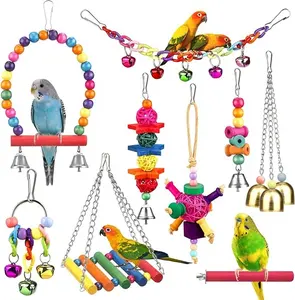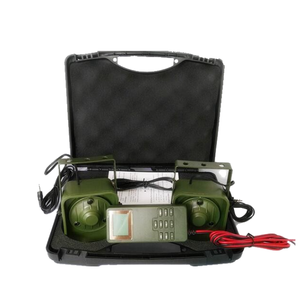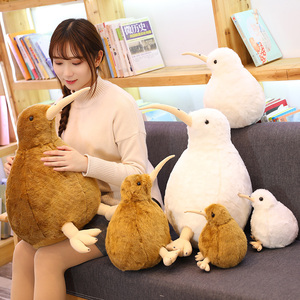(3390 products available)




























































































































































The avian bird community is diverse and includes several species, each with unique traits and suitability for various living conditions. It is crucial to locate the right bird species based on a few options, like size, vocalization, and activity level.
Small Birds
Small birds are fantastic for homes or restricted settings because they are easy to contain. Budgies make friendly companions, while canaries and finches are known for their lovely songs. They are Tiny and often need simple cages and a few perches, food dishes, and a small supply of toys for mental stimulation.
Medium-Sized Birds
Medium-sized birds like cockatiels, lovebirds, and conures have more individual requirements and living space. While cockatiels are friendly and often ready to engage with their owners, conures are renowned for their energetic nature and entertaining abilities. These birds need more complex cage designs and a greater variety of pet bird supplies.
Large Birds
Large birds, such as parrots, macaws, and cockatoos, are very social creatures and require more complex care. These birds frequently develop deep bonds with caregivers, demanding time, care, and attention. Due to their size and activity needs, they require larger cages and more stimulating environments. Their lifespan can also be very long, making them a birds' companion for several years.
Singing and Talking Birds
Singing birds, such as nightingales and warblers, are appreciated for their complex tunes and songs. They can improve the peace of any home with their singing ability. Talking birds such as parrots and mynas can pick up human voices and words, entertaining their owners with stunning vocal skills.
Exotic Birds
Exotic birds, including species like African greys, macaws, and cockatoos, are dazzling because of their colors and intelligence. They frequently require more care and attention than typical pet birds because they are larger, more intelligent, and have specific dietary and environmental needs. These birds can make lovely additions to a family or household when given the right conditions and attention.
Wire Gauge
Wire gauge selection is crucial because it directly influences the strength and safety of a cage for the birds. Larger birds must have cages made with a smaller wire number, which means the wire is thicker. A smaller wire number is needed for larger birds because it reduces the possibility of biting or breaking the wires. For smaller birds, a cage with a higher wire number is suitable because it avoids the risk of the birds slipping through the wires.
Cage Bar Spacing
The cage bar spacing is also important for the bird's safety. Depending on the type of bird, the space between the bars normally ranges from 0.5 to 1.5 inches. A greater distance in bar spacing can cause smaller birds to be stuck between the bars or even escape if they try. Because of their size, bigger birds can stay with a wider spacing of bars.
Cage Shape
Round and rectangular forms are other available options on avian cages. Round cages have no locations where the bird may consider a dominant perch, which can result in uneven perching and nesting behaviors. Rectangular cages are recommended over round ones because they provide more room for the birds to move and are better for their health and well-being. Rectangle cages offer more space for perches, toys, and exercise areas.
Cage Accessories
Accessories must be carefully selected to improve the liveness and safety of the avian cages. Non-toxic wood perches of varying diameters offer the birds a chance to practice their natural perching behavior without harming their feet. Toys are a great way to entertain birds physically and psychologically. They also challenge the birds to chew and move around. Avoid putting any perches or accessories inside the cage made of unsafe materials or with sharp edges that could potentially injure the birds.
Cage Maintenance
Maintaining cleanliness and hygiene is very important in avian cages, so choose a removable base tray beneath the cage bars. It makes the task of cleaning simple and time-saving. A corrosion-proof or rust-free wire material is necessary to guarantee that the cage will remain safe and strong for a long time. Stainless steel or powder-coated cages are very much easy to clean and do not get rusted over time. Thus, they are great for birds that require easy maintenance.
Companionship
Birds are social creatures who also enjoy the presence of others and will develop a strong bond with their owners. With many of their sizes, colors, and temperaments, they can meet a lot of people's needs and desires better than any other kind of pet. Wherever they are situated, birds can bring joy through their beauty. Their songs and regular interactions will help to make this happiness more enjoyable.
Low Maintenance
Birds offer a somewhat low-maintenance alternative to other common pets. Unlike dogs, birds do not need to be walked or given a bath often. Grooming is easier for birds as compared to grooming big animals. When providing the basic necessities such as food, clean water, and an appropriate cage, the daily demands of many birds are relatively low. Certain types of birds also handle solo well; when going on vacation, pet owners do not need to arrange sitters for their pets.
Space Requirements
Birds are ideal for people who have small living areas because they require less room than larger pets such as dogs or cats. They can be kept in small apartments or homes as long as their cage is spacious enough and they have room to fly and move around. A few of the birds can even interact with their owners and develop some fun personalities despite being small in size.
Intelligence and Training
Certain species of birds are exceptionally bright and can therefore be taught to do tricks and even reproduce some of the things they hear. This intelligence offers great interactions with pet owners. This can help create a great bond between pets and their owners by providing them with some activity and stimulation and some precious time talking and sharing with them.
Minimal Allergies
Pet birds may be the solution to those with inhalant allergies because they cause fewer allergic reactions than furry pets. While some people are allergic to cats and dogs, a bird can be a good choice for them. Even though it is still recommended to take precautions with the dust or feather inside the house, birds are a good option for people with pet allergies.
Cage Size and Shape
The selection of the correct size and shape of the cage is vital to ensure birds a comfortable environment. When choosing a cage, one should take into consideration the species of bird and its habit of moving around. Round and square-shaped cages each have their own benefits, but larger birds need more space, and smaller birds need adequate space for exercise and play.
Wire Gauge and Bar Spacing
The wire gauge and spacing in the cage bars are vital for securely housing the birds. The wire gauge is expressed as a number; the smaller the number, the thicker the wire. The bars should not be more than 1.5 inches apart to prevent the escape of small birds and ensure safety. The birds cannot escape from the wire because of the limited spacing between the wires.
Material Quality
Wire gauge refers to the thickness of the wire used in creating a cage, with the smaller number indicating a thicker wire. Using quality materials to make the birds' cages guarantee their safety and durability. Stainless steel and powder-coated cages do not rust. They are stronger, easier to clean, and remain safe for the birds for a long time. Non-toxic materials are safe for chewing and will implant fewer health issues in the birds.
Safety Features
When buying a birdcage, one needs to ensure safety from dangerous elements. Ensure that all the edges are smooth and all the corners rounded to prevent injury to the bird when it is exploring the cage. Close the door well because, with it, there is no way the birds will escape. Certain features that can enhance the safety of the birds include wear-resistant bases, perches, and food containers that can be fixed with little effort.
Accessibility and Maintenance
It is also very important to consider how easy it is to clean and do the maintenance work on the cage. Cleaning avian cages is easier when the cage has an easily removable base tray. The presence of side openings makes it easy to change the food and water containers.
A1: The ideal size for a bird cage depends on the species and personality of the bird. A few small birds like budgies and finches do well in a cage that is at least 24 x 12 x 18 inches, while larger birds like parrots and macaws will need much larger spaces to stay comfortable and healthy.
A2: Stainless steel and powder-coated metals are safe. Chewing on them will not cause any harm as these materials are resistant to rust and will be easy to clean. Birds should also avoid anything with painted or coated lead because that can be dangerous to their health.
A3: Cage shape is important because, in the same way, like other aspects of the cage, the shape has an impact on the psychological well-being and health of the birds. Rectangular cages are preferable to round cages because they give more room for birds to move around and are better for their health and well-being.